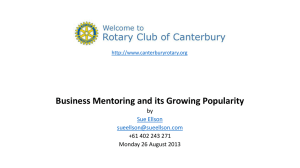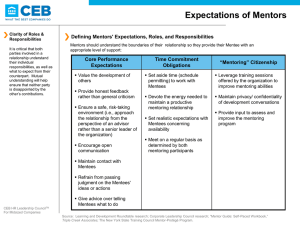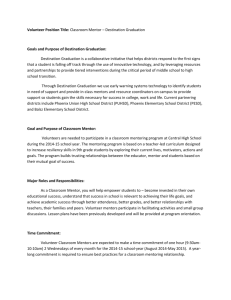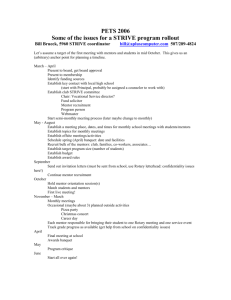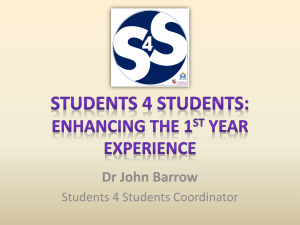Overall Project Case Study: Youth/ Inclusion The purpose of this
advertisement
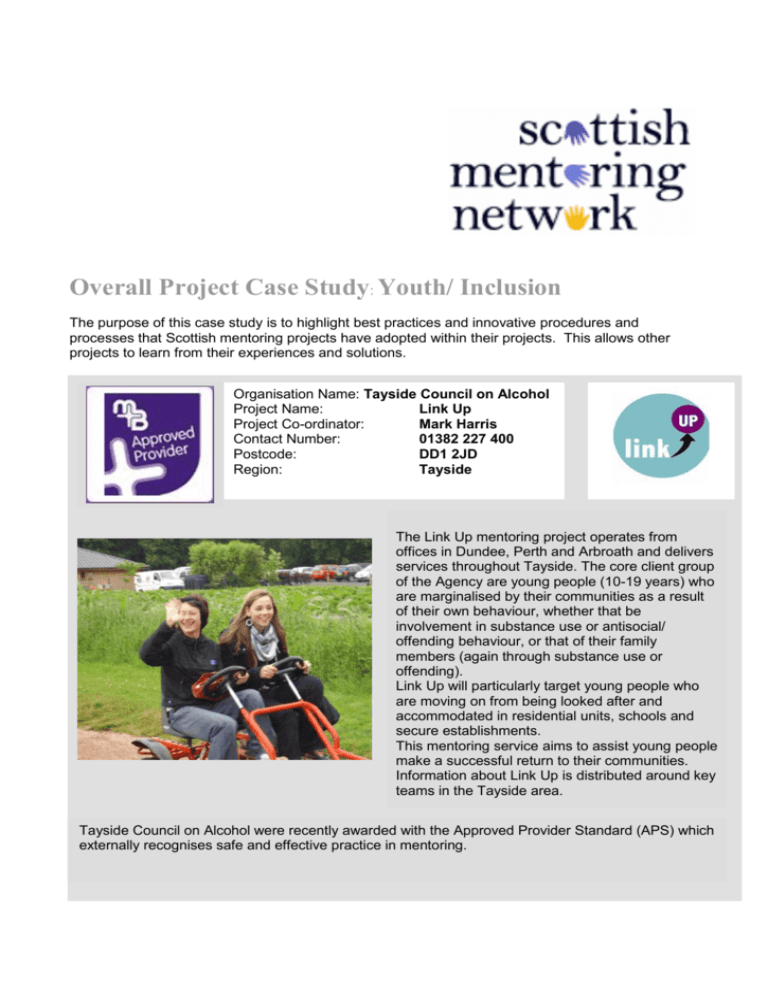
Overall Project Case Study: Youth/ Inclusion The purpose of this case study is to highlight best practices and innovative procedures and processes that Scottish mentoring projects have adopted within their projects. This allows other projects to learn from their experiences and solutions. Organisation Name: Tayside Council on Alcohol Project Name: Link Up Project Co-ordinator: Mark Harris Contact Number: 01382 227 400 Postcode: DD1 2JD Region: Tayside The Link Up mentoring project operates from offices in Dundee, Perth and Arbroath and delivers services throughout Tayside. The core client group of the Agency are young people (10-19 years) who are marginalised by their communities as a result of their own behaviour, whether that be involvement in substance use or antisocial/ offending behaviour, or that of their family members (again through substance use or offending). Link Up will particularly target young people who are moving on from being looked after and accommodated in residential units, schools and secure establishments. This mentoring service aims to assist young people make a successful return to their communities. Information about Link Up is distributed around key teams in the Tayside area. Tayside Council on Alcohol were recently awarded with the Approved Provider Standard (APS) which externally recognises safe and effective practice in mentoring. Recruiting Mentors Volunteer advertising is done in a range of ways best suited to the time of recruitment and would include promotional events, advertising and word of mouth. Recruitment takes place throughout the year. Mark will meet with potential Mentors and discuss the purpose of the organisation and the role of the volunteer Mentor. Volunteer applications returned are screened initially by relevant staff members prior to informal interview. Recruitment and selection procedures follow TCA policy and this includes standard activity such as the pursuit of references and disclosure Scotland check as well as interviews by service users undertaken during the training programme. Candidates who demonstrate that they match the criteria will automatically be invited to an interview. An informal interview is then held with potential volunteers and information is given on the service’s expectations of them. The service aims to understand the volunteer’s motivation to work with the Agency/ client group to ensure both the suitability of the volunteer and that the volunteers needs can be met during their volunteering time. As part of the recruitment selection they co-ordinate potential volunteers into a training programme ready for selection into the Link Up Mentoring Service. Volunteers are additionally required to attend an interview with a panel of young people comprised from the developing Link Project Peer Advisory Group. The volunteers will then have to be successfully matched to a young person. Volunteers are never matched unless the matching process is conclusive. Link Up considers how appropriate each volunteer is at each and every step of the selection process. Recently Link Up created some reversible display boards (with one side with information for referrers and the other for recruitment of mentors). These boards are displayed at external locations such as universities, colleges and volunteer centres etc. Mark feels that designing the boards has been worthwhile in terms of giving Link Up the ability to recruit mentors. Referring mentees Referral routes into the programme are open, but most referrals come internally from TCA’s current Adult Service clients and from their primary referral sources of Youth Justice, Anti-Social Behaviour Team, Social Work Fieldwork Team and Through Care Aftercare Teams to support young people who have been accommodated away from home and are returning to live in their communities. We will also encourage referrals from education, both mainstream and off site. All relevant agencies in the Tayside area are supplied with information leaflets about the Link Up Service. Young people are made aware of the service through promotional information, either given to referrers/family member or themselves. When a referral has been made, Link Up contacts the young person (or their family member or worker) to arrange an initial meeting. This meeting to discuss the link up project is at a time and place that is suitable for the young person and is carried out at the same time as the young person’s needs are assessed. This time is also used to explore the nature of the mentoring relationship, confidentiality, boundaries and develop an action plan to address the needs identified by the referrer and young person Mark likes to meet with the young person a couple more times to build a rapport which enables him to gain further insight into the needs and personality of the young person in order to provide the best match from the volunteering pool. Supporting the Project’s Mentors Link Up has a programme in place for training Link Up mentors. Each training session lasts two hours. To see a break down of their training please refer to Appendix 1. New matches are reviewed after an initial 6 week period, at which point either party has the opportunity to air any difficulties or withdraw from the programme. Mentors are required to attend on-going support and supervision, which is delivered on a monthly one to one and monthly group basis. Link Up also offers group meetings, individual support and supervision meetings and /or telephone support and supervision to their mentors. Group meetings are used to recognise successes, problem solve, encourage others, help mentors feel they are part of a team, offer suggestions for activities, identify training needs, announce developments within the service etc Individual support sessions are used to clarify their roles, ensure that mentors are accountable, off load, de-stress, think through issues, monitor and evaluate the match and ensure the match is meeting the stated objectives. Telephone support and supervision is used when mentors may be too busy or have missed a few support and supervision sessions due to work commitments etc. It gives the mentor a time that’s convenient to have some support regarding the mentoring relationship. Referring agencies are also invited to deliver talks and sessions at the on-going training and support sessions for mentors. Mentors can also access other training courses paid by the Agency. Reviewing/ evaluation To evaluate their year, Link Up staff use a template from Evaluation Support Scotland http://www.evaluationsupportscotland.org.uk/. (Scottish Mentoring Network website has an Evaluation Resource Pack for mentoring co-ordinators) Tayside Council on Alcohol uses the following methods of evaluation: * Baseline data (in line with the outcomes identified below) is gathered against which progress is reviewed. Progress towards these outcomes is recorded in the mentoring evaluation forms. This method measures the levels of success in each individual mentoring relationship and provides evidence that TCA are meeting the aims of the service and more importantly making a real difference to the lives of the young people TCA are working with. * Meetings with mentors and mentees also highlight their feelings about the mentoring experience. * An ‘engagement pie chart’ is used as an evaluation tool. This involves creating a pie chart which splits up mentees into how many are highly engaged (meeting their mentor 3-4 times a month), moderately engaged (meeting their mentor 2-3 times a month), minimally engaged (meeting their mentor once every couple of months) or not engaged (decided after a few weeks that they don’t want a mentor). * Just as important are informal evaluations which occur at group activities that the mentees and mentors participate in. Such activities are Link Up bbq’s, days away and Christmas Dinner. Here Mark can sometimes get information on concerns and issues that any of the mentees or mentors may have. He also picks up tips about how to further improve the mentoring service. Tayside Council on Alcohol take on board the results from each of these evaluation methods and use the results to plan for improvements each year. Outcomes/Impact Achieved Last year’s evaluation highlighted some excellent results: * 26 young people were involved as Link Up mentees * Link Up have recruited 26 volunteer mentors * Link Up have trained 3 peer mentors * Link Up achieved the Approved Provider Standard (APS) award Training /employment Link Up worked with 7 young people on issues around training and employment. Over the last 9 months 5 of them started training/employment opportunities. 1 young person was having problems in school and attending school. After the first review things improved considerably and the young person is feeling more positive about school and attendance has improved. Offending behaviour 1 young person was working on issues around alcohol and offending behaviour and is one of the young people starting training. 9 young people are working on issues around offending behaviour and 5 have managed to make progress in reducing criminal activity/anti social behaviour. 1 young person is moving from secure accommodation and is being supported to reintegrate back into the community. Confidence and self esteem Link Up worked with 8 young people on issues around self esteem/friends etc. Over the last year 5 young people have attended a local youth group and other activities, such as bowling and swimming. They are able to measure confidence and self esteem during planned group activities such as the group outings they arrange over the summer. Community/Leisure activities All young people feel they have increased their participation in community activities/leisure activities and improved their self esteem and confidence. 6 young people were working on increasing participation in community and leisure activities and all six have made progress in this area Mentor Career opportunities Over the last 12 months 8 volunteer mentors have moved on to careers working with young people. Making it work TCA believes that the Link Up mentoring service is such a success because of the following: - Potential volunteer mentors are assessed throughout their training - Offering flexible ongoing training that fits into the mentor’s time - Mark keeps a ‘Mentor checklist’ to remind himself of issues such as what training each mentor has been through, whether their Disclosure Scotland form has come back and when they began mentoring etc - All contacts between the Link Up staff and the mentees are logged - Mentors are never expected to have all the experience needed when their mentee experiences challenges. Out of hours support is available to mentors on a 24/7 basis to fulfil the agency standards around staff safety/ lone working and support. Useful tips for other mentoring co-ordinators to consider: Get the mentor’s disclosure forms sent away as soon as possible (before training) so that once they have been trained they can start mentoring without too much of a delay! Mark says he cannot describe how helpful going through the Approved Provider Standard (APS) application was. For more information about the Approved Provider Standard please get in touch with Scottish Mentoring Network on 0141 225 8009/8030. Appendix 1. Description of Link Up’s Mentor training programme units 1. THE ROLE OF THE MENTOR - Stages in mentoring - Developing a rapport and building trust with the mentee, - Setting goals and reaching them, - How to access services (career centre, leisure, training etc). - Exit and renegotiation of goals 2. DISCLOSURE SCOTLAND - Mark likes to start the mandatory processing of Link Up’s Mentors’ Disclosure Scotland forms early as these can take a while once they are sent off. 3. ALL ABOUT DRUGS AND ALCOHOL . This is where the mentors find out about the possible personal situations and circumstances that the Link Up mentees could come from. 4. CHILD PROTECTION, CONFIDENTIALITY AND CHILDREN’S RIGHTS – Link Up have their own Child Protection Officer who delivers this session. Mentors are presented with various scenarios and asked what they would do in those situations. There is open discussion within the group afterwards. 5. MENTOR’S PERSONAL PROFILE- this is where Mark obtains a base document to help him match the mentor with a mentee. Mark asks the mentor to write down their favourite films, religious beliefs, top 3 magazines, books, if they are an indoor/outdoor person, new activities they would like to try etc. 6. Boundaries, Insurance and safety guidelines – Boundaries within the mentoring relationship are explored. The on call system is explained to all mentors. A personal safety checklist is discussed. Finally, mentors are required to attend an interview with a panel of young people comprised from the developing Link Project Peer Advisory Group.

